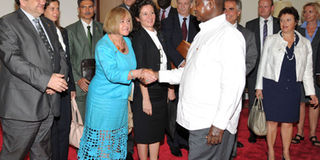Museveni warns EU envoys over spying

President Museveni welcomes the Irish ambassador to Uganda, Ann Webster, who was part of the European Union heads of mission in Uganda delegation that interacted with the President at State House Entebbe on Wednesday. PHOTO BY PPU
What you need to know:
President responds
On anti-gay Bill: Those people were not killed, not discriminated and never persecuted. But black Africans have always kept their sexual matters confidential. I have been married to a beautiful lady called Janet for 38 years but I have never kissed her in public or in front of my children.
Sexual matters, heterosexual or homosexual must be confidential.
On A4C activities: Their intention is to provoke police to shoot so that innocent civilians are hurt and turn against government. I totally agree that demonstrations must be coordinated by the police.
President Museveni has issued a stern warning to European diplomats in Kampala over claims that the embassies are recruiting politicians and government officials for espionage.
Mr Museveni was on Wednesday meeting European Union ambassadors accredited to Uganda, during their routine political dialogue with the President.
At the meeting, Mr Museveni said he had reports that the diplomats “invite our young Members of Parliament; give them funds which are not reported either in Parliament or the Ministry of Foreign Affairs”. “This is corruption, if they get money which they don’t declare … If you get money from foreign sources and don’t declare to IGG, Parliament or police, you are not only corrupt, but an agent,” Mr Museveni is quoted as saying, in a State House Press release sent yesterday.
He cited a female member of Conservative Party in the UK, only identified as Philippa, who he accused of funding various politicians’ travels in various countries.
It is not clear whether the President meant Ms Philippa Stroud, an official of the ruling party in the UK.
The EU, however, issued a statement yesterday saying, the President’s concerns about spying was a matter discussed for few minutes out of a five-hour meeting. EU head of delegation Dr Roberto Ridolfi described the meeting, attended by all ambassadors to Uganda, as having been held in “very good spirit”.
The Western powers have recently criticised Museveni’s government for dispersing political demonstrations led by the opposition politicians. Some of them have also threatened to cut aid support to Uganda over the anti-gay Bill currently in Parliament, which they say is repressive and abuses gay rights.
In response to questions raised by the diplomats on why UPDF soldiers are represented in Parliament, Mr Museveni said the army needs to be in Parliament to understand national politics.
“The UPDF is in Parliament as a listening post. Why are you worried about them being there? Many people in Parliament were not there when we fought, so the UPDF links the past and present by exploring their history to enrich debates.”
“The army council elects these people and they are not partisan. That inculcation of our history is important in Parliament. Do not paralyse democracy, let it evolve,” the President said.
Mr Museveni was also asked about his failure to appoint a substantive Inspector General of Government, holding back efforts to fight corruption.
He responded that he was being cautious before appointing an IGG to replace Justice Faith Mwondha, who left the position three years ago acrimoniously, after she declined parliamentary scrutiny.
“This is a war. I have not appointed the IGG because I don’t want a game warden who is a poacher. When you make random appointments, it can be problematic,” he said.




